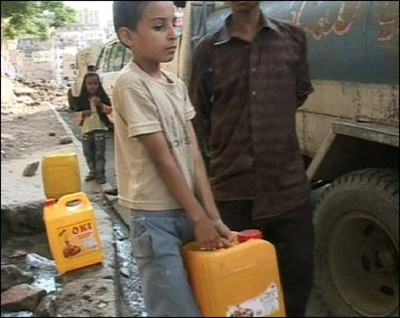Yemen Feature: The Unresolved Economic Crisis (Salisbury)
 Peter Salisbury writes for Foreign Policy:
Peter Salisbury writes for Foreign Policy:
In late 2011, the British government sent one of its top humanitarian advisors to Yemen after a year of protests, bloody crackdowns, and inter-elite fighting. Drawing on his experience from a career spanning three decades, the advisor reported back that Yemen faced the most complex set of circumstances he had ever seen.
Some of the key issues at the time, such as fighting between elite military and tribal factions in the capital of Sanaa and north Yemen's second largest city, Taiz, have since eased off. But others, including rising violence between Shiite Houthi tribesmen, government forces, and Sunni Salafists in the northern Saada province and the rise of Ansar al-Sharia --- the local Al Qa'eda affiliate -- in the south, are still causing mass displacement on a daily basis.
Refugees and economic migrants from Somalia and Ethiopia continue to pour into the country. The United Nations High Commissioner for Refugees registered more than 100,000 new arrivals in 2011 alone. Hunger among the Yemeni poor has reached a crisis point with about 5 million going hungry so regularly that it is damaging their health. Some 5 million more only just get enough to eat according to the World Food Programme.
Meanwhile, Yemen's economy, fragile and sclerotic at best, effectively ground to a halt in 2011. A series of explosions damaged a major oil pipeline which is the source of most of the country's fuel. The ensuing shortage of diesel fuel, used to transport goods across the country and to pump most of the country's water, led to a sharp increase in the price of food and water. The government was forced to import fuel and hemorrhaged foreign currency reserves normally used to settle the hefty import bill that covers most of the wheat and rice eaten in the country.
In the end, Saudi Arabia stepped in with donations of oil and fuel products to keep the economy going. However, even with Saudi support, foreign currency holdings at the Central Bank of Yemen dipped 25 percent, from $5.7 billion at the end of 2010 to $4.3 billion in December 2011. Riyadh is currently committed to supplying Yemen's fuel needs until May.
Unemployment was also exacerbated by the crisis. Joblessness was above 40 percent on average and as high as 70 percent among people under 25 years old in 2010. It climbed as factories closed, farmers struggled to irrigate their crops, and fuel shortages and near-constant blackouts made all but the simplest economic activities nearly impossible. By some accounts, almost two-thirds of Yemenis were out of work by the end of 2011.
"There is already a humanitarian crisis in Yemen," the policy chief of one European aid agency retorted sharply when asked if the country is moving toward crisis. The problem, she said, is that Yemen is suffering multiple, interconnected crises rather than having one easily identifiable problem.
It does not require a stretch of the imagination to believe that these factors --- mass displacement, hunger, a weak rentier economy in free-fall, and rising unemployment --- could mean a grim fate for the 10 million-plus people currently living in poverty in Yemen.

 Friday, April 6, 2012 at 7:55
Friday, April 6, 2012 at 7:55